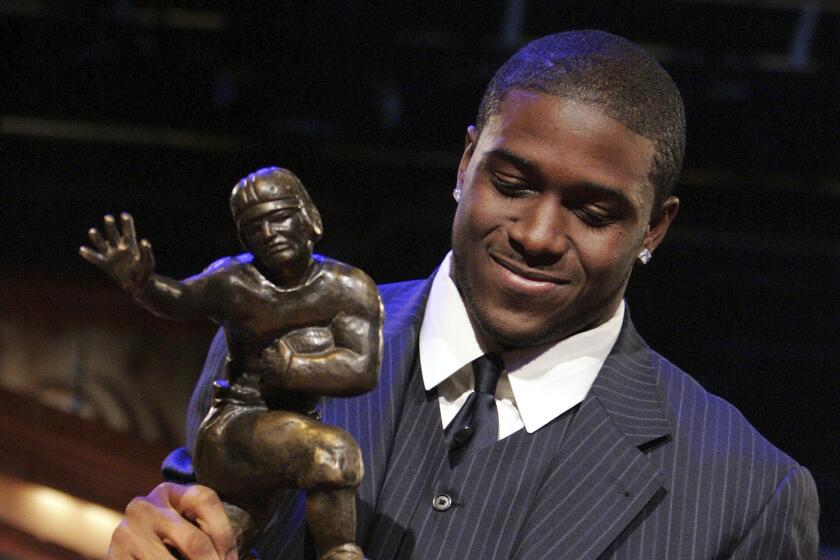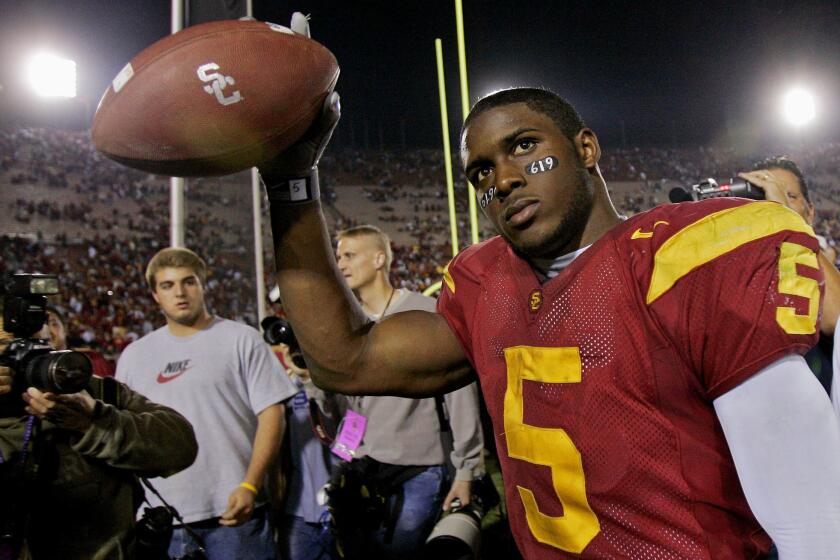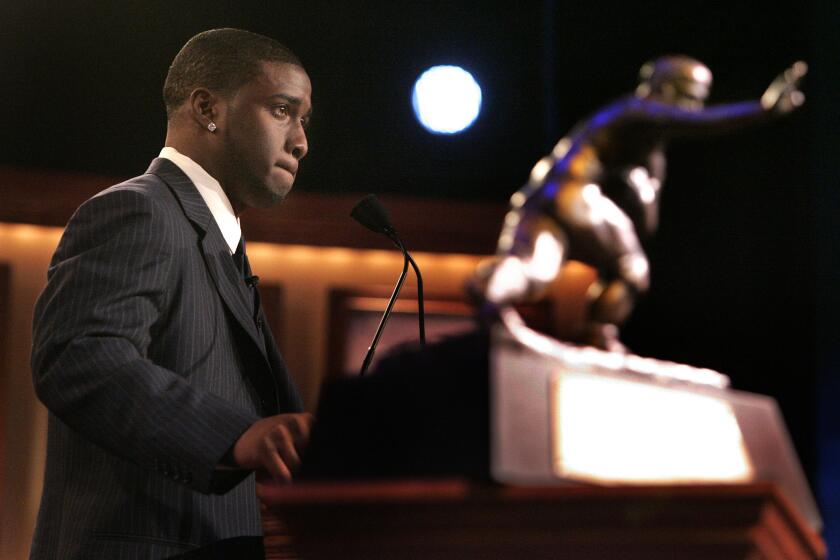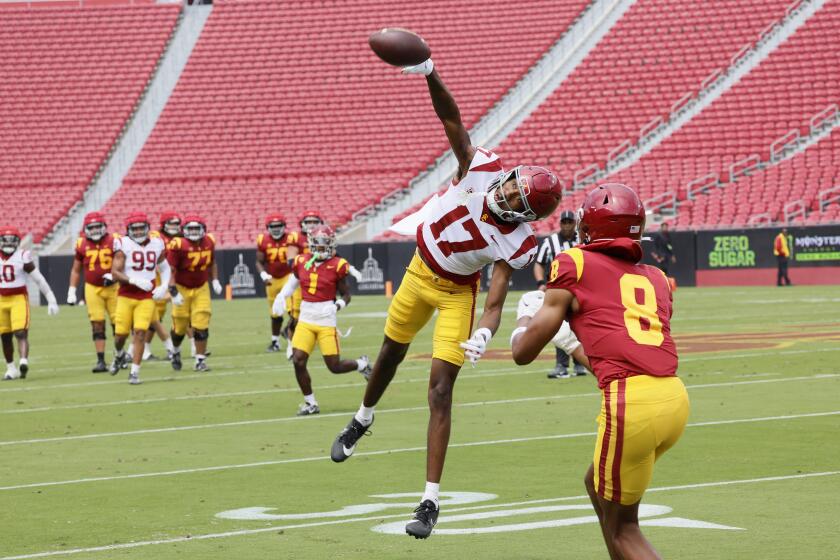Colleges, Athletes Learn Downside to Websites
USC guard Gabe Pruitt had clearly been hoodwinked. Reached on his networking website by what he thought was a cute female student, Pruitt e-mailed his cellphone number.
But it turned out to be a farce when, at a March basketball game against California, students held up his number and chanted the fictitious girl’s name as he shot free throws.
The hoax was harmless, but the personal nature of networking sites such as Facebook and MySpace is a growing concern for college athletic programs and coaches.
“We’ve told them that we don’t want to limit their participation on these sites, but we want to educate them on appropriate and positive uses,” said Tim Tessalone, USC’s sports information director. “It would be wise to limit personal information for security reasons.”
The free sites, increasingly popular among high school and college students who use them to keep tabs on friends, contain personal pages for each user. Students who join the sites maintain profiles on which they can post pictures and personal information such as cellphone numbers, addresses and sexual orientation. But they are a technological headache for school officials charged with protecting student-athletes and the image of their universities.
Some are concerned that the sites negate the buffer between student-athletes and agents, gambling associates and overzealous fans, leaving programs vulnerable to NCAA violations.
They can also be the source of embarrassment.
Although most of the sites’ contents are innocent, risque photographs posted by student-athletes have prompted investigations -- and in some instances sanctions -- across the country. A number of pictures posted on networking sites highlighting student-athletes engaged in hazing and underage drinking surfaced on Badjocks.com, a watchdog website that bills itself as a cross between “Cops” and “SportsCenter.”
Photos involving the women’s lacrosse team at UC Santa Barbara, the women’s swim team at Loyola Marymount and the women’s softball team at Claremont-Mudd-Scripps were among those featured by the site.
A review of members of the USC football team on Facebook on Monday turned up photographs of players in seemingly compromising situations, including underage players holding what appear to be alcoholic beverages.
Many student-athletes view the sites as accessible only to other college students, but in reality, the profiles are just a few mouse-clicks away from the rest of the world on the public domain of the Web.
“It’s a very serious topic and one we are just now delving into,” said Petrina Long, a senior associate director of athletics at UCLA. “Technology is unfortunately somewhat age-specific, and it’s going to be difficult for a while to fully comprehend it.”
Oscar Lua, a senior linebacker at USC, is one of several Trojans contacted over their sites by agents looking to gain an edge over competitors.
“I was kind of shocked when I saw that they could get on there,” Lua said. “They warn us about agents that come on through our Facebooks a lot of the times, but that’s just about as much as coaches get to warning us about any kind of message boards.”
USC football Coach Pete Carroll said he hadn’t cautioned his players about the sites but would probably discuss them in the future.
“You just try and continue to create a mindfulness on our football team that our players individually must make good choices and good decisions all the time,” Carroll said. “But this stuff is so new and such an open domain.”
Although most area colleges have no official policies regarding what student-athletes can or cannot post on the sites, some are concerned enough to have asked student-athletes to remove indecent messages or photographs.
The same anxieties are evident at college campuses across the country.
The University of Kentucky may face violations because Internet users posted messages on a recruit’s MySpace page in an attempt to lure him to the school, the Louisville Courier-Journal reported.
At Louisiana State, swimmers Eddie Kenney and Matt Coenen were removed from the school team after criticizing their coaches on Facebook message boards.
At Colorado, offensive tackle Clint O’Neal was accused of sending racially offensive Facebook messages to a Latino cross-country runner.
And Loyola University of Chicago banned its athletes from the sites and threatened the loss of scholarships if they refused.
Colleges are especially worried over the contents of MySpace, where personal pages can be seen by anyone who signs up with the site.
Only those with a university e-mail address can sign up for Facebook. And even then profiles are viewable only by others who attend the same university -- unless the member adds a student from another school to their profile as a “friend,” giving each access to the other’s information.
UCLA’s Long said members of Bruins sports teams are fully aware that the university is watching such sites.
“If people are violating rules, then they will be punished,” Long said. “We made it clear those areas are going to be fair game, so they need to be intelligent about how they use them.”
The NCAA has yet to adapt rules about the sites, but that soon might change. The sites have been the subject of discussions at recent NCAA student-athlete leadership conferences.
Area college officials said they are hesitant to restrict student-athletes from the sites because they can be used to contact long-distance friends and generate campus interest in athletic events via message boards.
“They certainly aren’t primarily negative,” Long said. “They are communication tools that can also be used for the good of the university and its teams.”
If student-athletes want to avoid the potential hassles of the sites, they can simply follow the lead of USC receiver Steve Smith.
“Some guys have computers in their house that they run to all the time,” Smith said. “When I’m bored, I just play video games.”
Go beyond the scoreboard
Get the latest on L.A.'s teams in the daily Sports Report newsletter.
You may occasionally receive promotional content from the Los Angeles Times.



